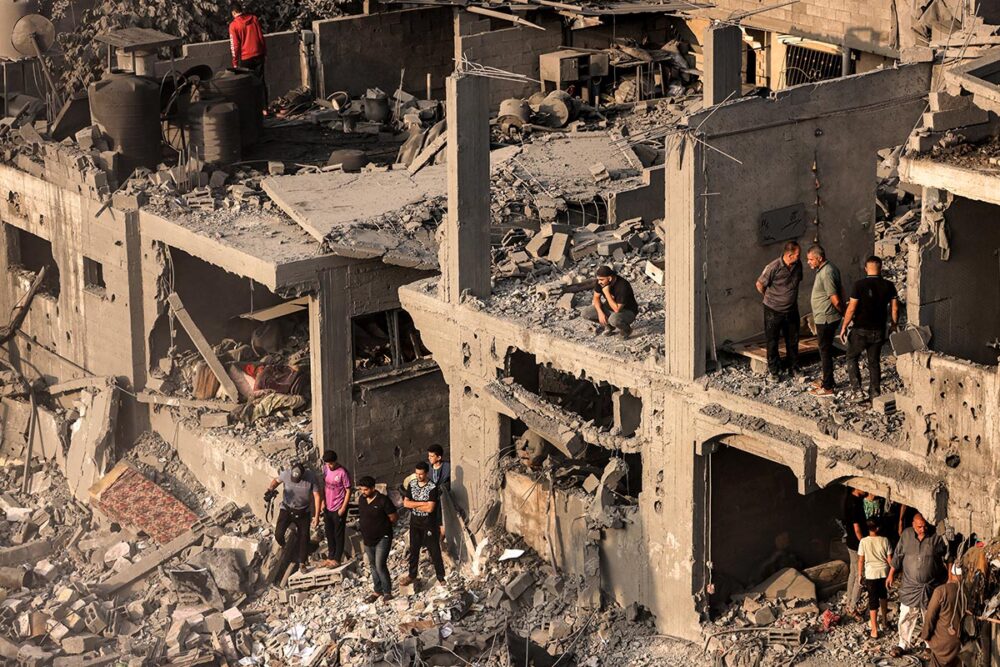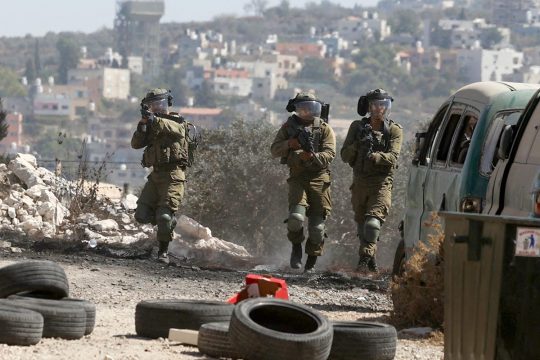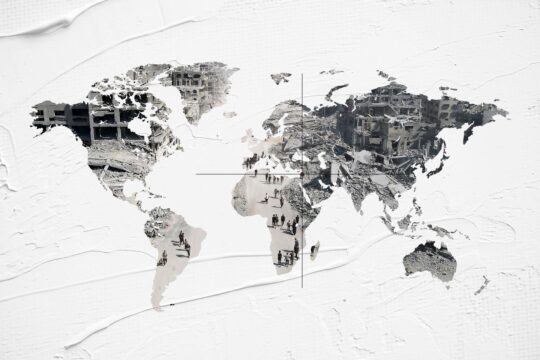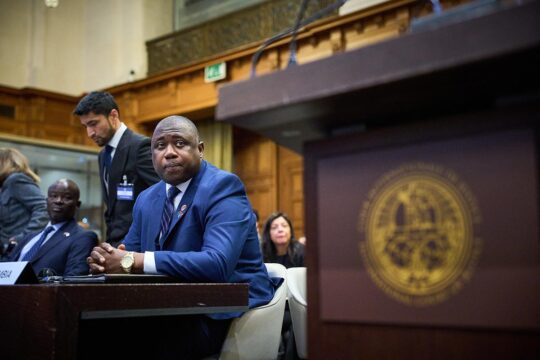A video of a group of Israeli soldiers singing and chanting “there are no uninvolved civilians” resounds around the Great Hall of Justice at the Peace Palace in The Hague on January 11. South Africa is using the images to underline its argument that Israel is committing genocide against the Palestinian people. It has brought Israel to the International Court of Justice (ICJ) to answer a number of allegations; that Israel is not only committing genocide against the people of Gaza, but that it has failed to prevent genocide, failed to punish genocidal talk, and normalised genocidal rhetoric. The video relates to a number of statements by Israeli officials including the prime minister about destroying and “rooting out” the enemy.
In order to prevent further harm to Gazans, Pretoria has also asked the court to require provisional measures - a form of international legal emergency restraints - aimed at stopping further deaths and injuries in the beleaguered Gaza Strip.
At a two-day sitting in The Hague lawyers from either side argue about the realities on the ground and the interpretation of legal aspects of the claim. There will be no finding of genocide though, because the full case will take several years to be argued. This urgent session, the first of 2024 for the UN court, is a way to circumvent the veto powers wielded by Israel’s closet ally, the United States at the UN Security Council, and ask the judges to require a ceasefire in Gaza. “South Africa only has to show that its claims are plausible, that there's a real risk genocide either is occurring or will occur if the court does not take emergency action,” comments Adil Haque, professor of law at New Jersey’s Rutgers University, in the US.
“Nothing short of the destruction of Palestinian life”
Israel’s strikes started after Hamas and other Palestinian militia attacked Israeli towns and villages from Gaza on October 7 last year, killing some 1200 people and taking several hundreds hostage. Israel besieged the Palestinian territory and prevented food and other supplies from getting in. It has conducted a massive bombing campaign, aimed it says at destroying Hamas leadership. It has told most of the 2 million residents to move while its ground forces entered and tried to destroy the extensive networks of tunnels Hamas has built under the Gaza strip.
UN experts have been describing a shocking humanitarian situation with most of Gaza’s hospitals unable to function, massive damage to civilian infrastructure, not enough food able to be distributed safely to stave off famine. The Hamas-run ministry of health estimates nearly 25,000 have died in the 3-month long campaign.
South Africa’s arguments to the 17 judges hearing the case began by placing the alleged genocidal acts “within 75 years of apartheid occupation and siege” and decades long impunity for widespread human rights violations. They followed up with lawyer Adila Hassim quoting the Secretary General of the UN saying “nowhere is safe” in Gaza. She described relentless bombing, the uncounted under the rubble, the numbers of bombs dropped in areas Israel had told civilians were safe. “This killing is nothing short of the destruction of Palestinian life. No one is spared, not even new-born babies,” she pleaded.
“No matter how horrendous an attack, genocide is never allowed”
Irish lawyer Blinne Ní Ghrálaigh, a member of South Africa’s legal team, focused the effects of the Israeli campaign on the most vulnerable. She pointed to the “irreparable prejudice” Gazans face without intervention as entire multi-generational families will be obliterated. She quoted the ICJ’s own cases back – for example, as recently as November 2023 in Armenia v. Azerbaijan, where they had intervened because children were unable to attend school and people were forced out of their homes.
“It was effective,” comments Mike Becker, Assistant Professor of international human rights law at Trinity College in Dublin. And, he continues: “Frankly, it was a harrowing presentation,” highlighting the part where the lawyer explained the “WCNSF” acronym used for the first time in the world by doctors in Gaza – Wounded Child No Surviving Family.
“The very reputation of international law hangs in the balance,” Ní Ghrálaigh pleaded in court. “Gaza represents a moral failure” and the world “should be absolutely horrified that there is no safe space in Gaza. The world should be ashamed.” Vaughan Lowe, another member of the legal team for South Africa, pointed to the use of bunker busting bombs in civilian areas. It’s “not just a question of scale. It’s also a question of intention.” Lowe wanted to pre-empt Israeli arguments on legitimate self-defence. “No matter how horrendous an attack, genocide is never allowed. Including the obligation to prevent genocide,” he pleaded.
Amichai Cohen, professor of international law at Israel’s Ono Academic College told Justice Info he thinks this is “the most problematic part of the South African argument,” that so little was said on the war itself and the context of the armed conflict with Hamas.
The right of Israel to defend itself
On the second day, Israel presented its version of events. Tal Becker told the judges that South Africa is not offering a lens but rather a blindfold. The South Africans, he says, have failed to understand the nature of intensive urban armed conflict and how the Hamas authorities in Gaza embedded itself within and beneath civilian areas. They “turned massive swathes of civilian infrastructure” into “terrorist territory,” he said. This is an “unconscionable request for a ceasefire,” he added, “because it inhibits Israel’s ability to defend itself.”
Israel’s lawyers also argued against the “distorted” picture presented by South Africa and showed pictures of weapons fired from schools by Palestinian militants and found inside a child’s bed. Omri Sender gave many details on the amounts of flour and water being allowed into Gaza and how Israel was working with the new UN humanitarian coordinator. He reiterated that Israel “remains bound my international legal obligations including genocide convention.” And he challenged the applicant’s suggestion that “you cannot take word of state.”
Professor Mike Becker thinks “the court will be sensitive to the security challenges that Israel faces” in part because “both parties to that armed conflict aren't in front of the court.”
Hate speech
South Africa has also submitted a number of statements from Israeli officials to tackle an essential part of the Genocide Convention – that of proving the special intent to destroy a group in whole or in part. On the day of the Hamas attacks Prime Minister Netanyahu warned of an “unprecedented price” to be paid by the enemy. The Deputy Speaker of the Knesset, Israel’s Parliament, called for the erasure of the Gaza Strip from the face of the earth. The Defence Minister Yoav Gallant told troops that he has “released all the restraints” and that “Gaza won’t return to what it was before. We will eliminate everything.”
Professor Cohen of Ono Academic College says the continued hateful rhetoric emerging from Israel was the “weakest point” of Israel’s arguments despite all the “humanitarian assistance coming in and the evacuations and the warnings and the cooperation with the UN.” Professor Becker noted a few mentions by the Israeli team of investigating hate speech. “But South Africa pre-empted that point by saying, that's all well and good, but those investigations appear to have started within the last 36 hours or something like that, in response to the ICJ cases being filed.”
Christopher Staker, arguing on the Israeli side, said that this application for provisional measures was being used as a sword for one to gain military advantage. The lawyers for Israel stated that the guiding legal framework to examine what was happening in Gaza should be international humanitarian law, and that Israel was following it. The provisional measures are “unwarranted and prejudicial,” he told the judges.
And we’ll all be back in court next month
“The court can't order Hamas to step down or enter into a cease fire,” comments Professor Becker. “I don't think the court will leave it unaddressed. I think they will try to come up with some formulation that urges or directs Israel to act with greater restraint.”
Professor Haque agrees. “South Africa basically copied and pasted this [provisional measures] request from the order in the Ukraine case,” he said referring to the case filed before the ICJ by Ukraine against Russia in 2022. “And I think one difference is that in that case, Ukraine could plausibly say that if Russia stops fighting, we will stop fighting. But here, South Africa cannot guarantee that if Israel stops fighting, Hamas will stop fighting.”
The judges face a difficult task to balance the very different perspectives presented to them. Haque says they are likely to rule for some type of measure, especially something to address the humanitarian crisis because “if the risk of mass death from famine and disease cannot be avoided without a suspension of military operations by Israel, that alone is sufficient to justify this request, because whatever Israel's legitimate interests might be, they are simply outweighed by the need to avoid a genocidal result, to prevent Israel's conduct up to this point from actually resulting in the destruction of a group in whole or in part.”
Becker thinks that despite Israel’s arguments that they should be trusted “the sheer scale and gravity of the humanitarian situation may well mean that that's not enough.” He anticipates that, “at a minimum, enough judges will be convinced that ‘We're glad to hear that Israel is doing everything it can to facilitate humanitarian assistance, but there's no real harm then in us indicating provisional measures to hold Israel to that promise’.”
In February the ICJ judges will start hearings on an advisory opinion the UN General Assembly asked from the court on the occupation of Palestine territories. No matter what decision they make on the provisional measures now, many of the judges will be back to hear again arguments about the Israel-Palestine conflict next month.








